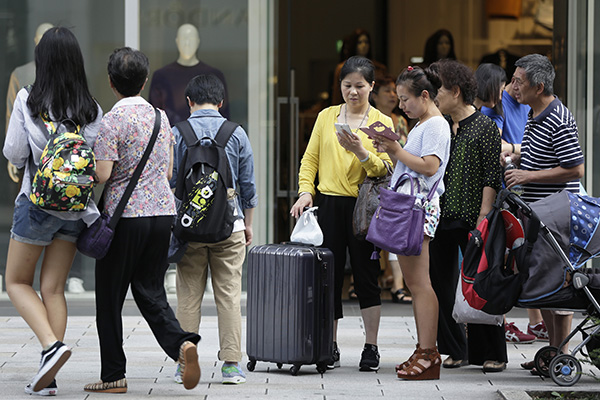Chinese could soon become model tourists
- By Zhang Zhouxiang
 0 Comment(s)
0 Comment(s) Print
Print E-mail China Daily, September 29, 2015
E-mail China Daily, September 29, 2015
|
|
|
Chinese tourists visit Tokyo's Ginza district for shopping in August. Japan is the second-most popular overseas destination. [Photo provided to China Daily] |
More Chinese tourists are expected to travel abroad during the National Day golden week holiday. This is good news, except that the media have been reporting one incident after another of the uncivil behaviors of some Chinese tourists overseas. Some media outlets have even termed their behaviors, such as jumping queues, talking aloud and spitting in public, as rude.
Indeed, ill-behaved tourists should be condemned, and urged to behave properly, especially while traveling abroad. But it is unfair to condemn Chinese tourists as a whole for the bad behaviors of just a few.
In the first half of 2015, Chinese people paid 127 million visits overseas, and only a small percentage of them were guilty of uncivil behaviors. Not all Chinese people traveling overseas can be accused of uncivil behavior. Most of them respect and follow local customs and etiquettes, and are well behaved.
In fact, some of the behaviors of Chinese tourists considered “rude” abroad are the result of cultural differences, which can only be bridged gradually. For example, many Westerners complain that Chinese tourists talk loudly in public, but many Chinese do not realize that talking loudly is uncivil behavior.
Chinese tourists have earned a bad name also for dining in large groups. Even in restaurants where tables are arranged separately, they sometimes put tables together to make a bigger one so that they can dine together in a large group. This is not surprising, because Asians, Chinese in particular, consider dining in large groups to be auspicious. Do not isolate anyone — that’s part of Chinese social philosophy.
But when reminded of Western customs, most Chinese tourists are ready to temporarily sacrifice their traditional beliefs to suit the environment. And after the National Tourism Administration published the Civilized Behavior Guide in 2013, an increasing number of tourist guides have been urging Chinese tourists to follow local customs and other social norms. As a result, most Chinese tourists have become the epitome of etiquette.
But we have to accept the cultural differences. Eating silently, not breaking queues and paying keeping in mind the likes and dislikes of foreigners are some of the things Chinese overseas tourists have to bear in mind.
Chinese tourists are not the first to be criticized for their behaviors. When people from populous countries start traveling abroad in large numbers, it is likely that their behaviors, rooted in their cultures, will be criticized. Japanese tourists went through the same experience in the 1960s and 1970s because, for example, they rushed into shops to buy luxuries, and South Korean tourists were labeled “noisy” in the 1990s when they started visiting Western countries in large numbers. Today, Japanese tourists, accustomed to the nuances of Western customs and social norms, are among the most polite tourists in the world. As such, it should not take a long time for Chinese tourists to become one of the best behaved in the world.






